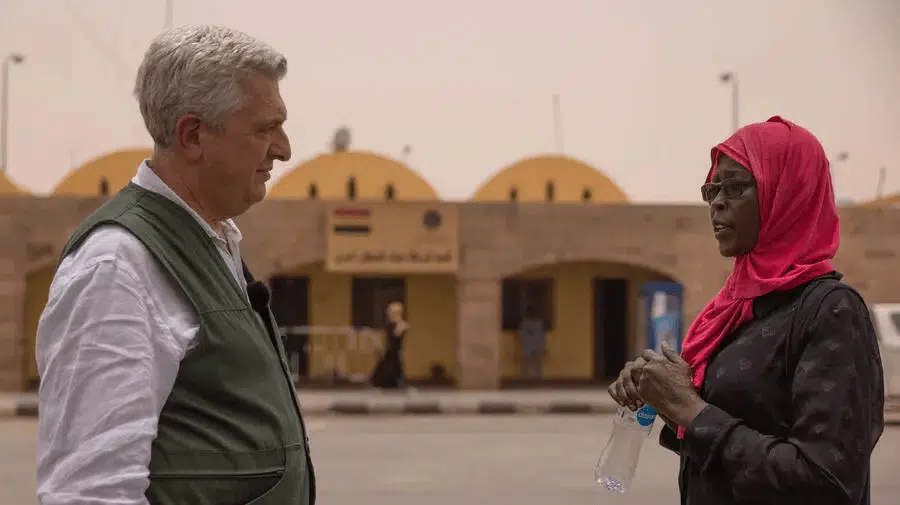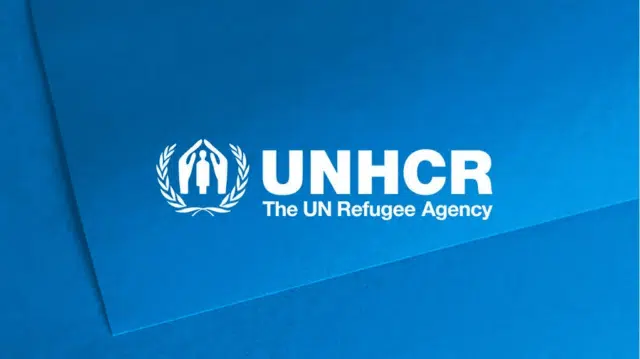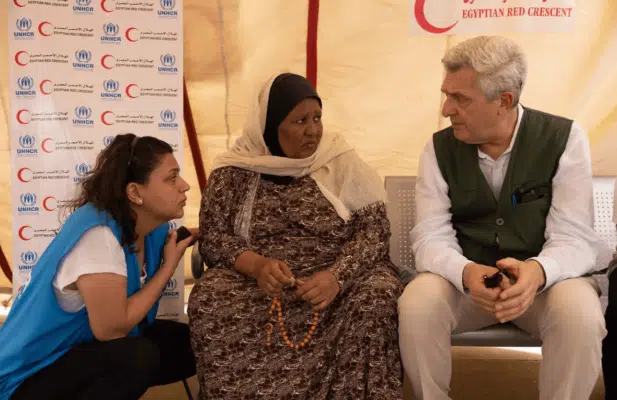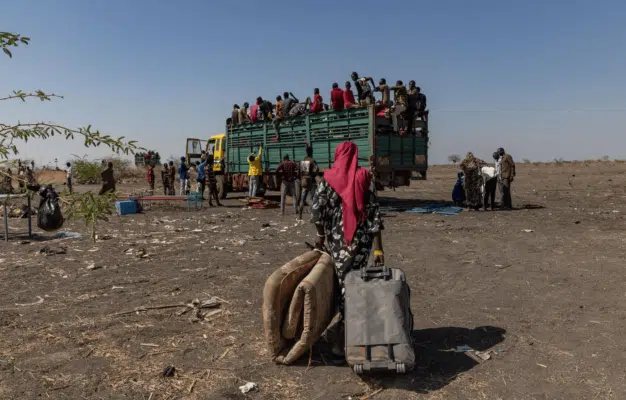
UN High Commissioner for Refugees Filippo Grandi speaks to Razaz Ezzeldine El Tayeb at the Qustul border crossing after she and her family entered Egypt from Sudan. © UNHCR/Pedro Costa Gomes
After meeting refugees who escaped the violence, UN High Commissioner for Refugees appeals for borders to remain open and greater international assistance for those fleeing and their hosts.
When violence erupted last month in her home city of Nyala in the South Darfur region of Sudan, Huwaida Mohamed Hassan’s only thought was to get her children to safety. Unable to contact her husband, she set out on the long journey northwards to Egypt with her seven children and two nieces who had become separated from their parents.
With few belongings and little means to support themselves, Huwaida relied on the generosity of strangers to feed them during the 10-day voyage to the Egyptian border, but she and the children often went hungry. Despite the hardship and uncertainty of the journey, Huwaida said it was preferable to the risks of remaining in Sudan.
“It’s very difficult over there. The fighting is still going on,” she said. “I saw girls getting raped back home. I have four girls myself, and I want them to be safe.”
In the six weeks since the start of fighting between two military factions in Sudan’s capital Khartoum, which quickly spread to other parts of the country, nearly 380,000 people have fled the country. Around 170,000 have sought safety in Egypt, making it the largest host among the countries neighbouring Sudan.
UN High Commissioner for Refugees Filippo Grandi visited the country this week, travelling to the country’s southern border with Sudan to speak to newly arrived refugees. He also met with Egypt’s President Abdel Fattah Al-Sisi and other senior officials in Cairo, as well as Huwaida and other refugees now living in the capital.
At the main border crossing in Qustul, Grandi met Sudanese refugee Razaz Ezzeldine El Tayeb, who had just arrived with her three half-sisters and 90-year-old grandmother after fleeing the city of Omdurman near Sudan’s capital Khartoum. After nearly two weeks waiting, Razaz and her family were nevertheless relieved to have finally crossed the border, despite being shot of money and not knowing where they would spend the night.
“I came to Egypt because of the fighting,” she explained. “It was very scary back home, beyond anyone’s imagination. Rape, looting, theft – you name it. You don’t know who is who – are they thieves, are they soldiers?”
Inadequate funding
“I spent some time today speaking to some of those refugees and again and again they told me terrible stories of fear, or fighting, of insecurity,” Grandi said.
The High Commissioner praised the Egyptian government and people for providing safety to those escaping the fighting. He urged the country to keep its borders open to those fleeing and appealed to the international community to do more to support Egypt’s response to the crisis.
“Egypt cannot be left alone, and the international community must support the response. We have launched a plan to support neighboring countries, but the funding received so far is extremely limited. There has to be more resources, faster resources, for Egypt, for the Red Crescent, for the United Nations Organizations including UNHCR in this humanitarian effort.”
“Once again, Egyptians have led by example with their hospitality, generosity and humanitarian spirit in giving refuge to thousands of Sudanese and other people fleeing. Please maintain this effort, please keep this border open to those who seek protection.”
Emergency response
As part of its response in Egypt, UNHCR is registering refugees who approach the agency, giving them access to a range of government services including health and education. UNHCR is also providing emergency items through the Egyptian Red Crescent to those crossing the border, offering counselling and psychosocial support, and has launched an emergency cash assistance programme to help the most vulnerable families.
Back in Cairo, after registering with UNHCR Huwaida and her family are now living in a small sparsely furnished apartment in the western outskirts of Cairo, which they share with another family. Many Sudanese families are being hosted by members of the large Sudanese diaspora community in the country, who are sharing their homes and what little resources they have.
“I have seven children; all I want for them is to be safe and to receive assistance to be able to feed them,” Huwaida said.
“Life was already very difficult in Sudan, but we accepted it. What is happening now is unbearable. Sudan was destroyed, just like that.”
Originally published by UNHCR on 02 June 2023.





